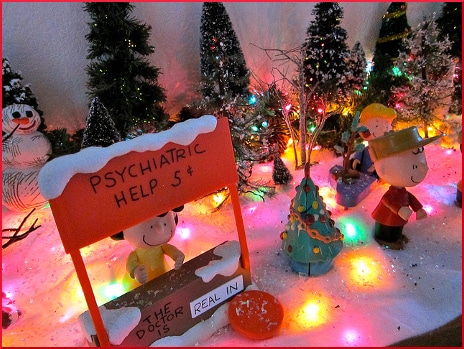
Childhood Obesity News is exploring the idea that people trained in the mental health field are the most appropriate and potentially effective treaters of obesity. Sadly, the psychiatric profession seems to be in something of a quagmire. For starters, it appears that the classic shrink is a dying breed.
The website Mental Health America lists the various types of mental health professionals we have in the United States. The psychiatrist must first be an MD before anything else, and is the only mental health professional who can prescribe medication. In the old days, a patient would spend months or years in Freudian analysis, but the direct counseling of patients does not much happen any more.
Then there is the child/adolescent psychiatrist, also an MD, trained to diagnose and treat emotional and behavioral problems. Again, many do not actually treat patients. The field also includes the psychiatric or mental health nurse practitioner, a registered nurse who has received specialized training.
A dire shortage
The National Council for Behavioral Health helps 2,300 not-for-profit clinics in need of staff to find psychiatrists. Recently, according to their spokesperson, that has been more and more difficult. As of two years ago, according to the federal government, there were about 4,000 parts of the country where psychiatrists were spread so thin the ratio worked out to about one psychiatrist per 30,000 people.
The state of Texas is not generally known for progressive attitudes or willingness to extend much of a hand to those in need, aside from advice to “pull yourself up by your bootstraps.” And yet, the Associated Press reported, Texas agreed to pay off the student loans of child psychiatrists, especially if they work in low-income areas and treat Medicaid patients. This is an indication of how bad things are.
Although psychiatrists are the only ones allowed to write prescriptions these days that is pretty much all they do. Prescribe, follow up, tweak the dosage, switch the patient to a different pharmaceutical formula — it’s all about the meds. Obviously, this is a crucial need.
Consider the point raised by an online commenter known as “shirley816,” a former patient who now works with many mentally ill people in a residential setting:
No one who is in need of a psychiatrist should be without a therapeutic support. All psychiatrists do in the treatment regimen is prescribe and monitor medications and if your mental disturbance is severe enough to warrant medications then you darn well should have a therapist to help with the day to day living with it.
Journalist Keith Humphreys reminds us that, legislatively, some progress has been made:
Congress increased Medicare’s reimbursement rates for outpatient mental health services and passed legislation strengthening benefits in insurance plans provided by large employers… The Affordable Care Act of 2010 built on these reforms by defining mental health as an “essential health benefit” in the Medicaid expansion and in private plans sold on health exchanges.
But, out of the few remaining psychiatrists only about half of them accept insurance, either private or public. Their scarcity allows them to conduct cash-only practices if that is their preference.
And who can blame them? Next time, we will look at the headaches involved in treating patients.
Your responses and feedback are welcome!
Source: “Types of Mental Health Professionals,” MentalHealthAmerica.net, undated
Source: “US faces severe shortage of psychiatrists as demand grows — report,” RT.com, 09/09/15
Source: “The troubling reason it’s so hard to find a psychiatrist in the United States,” WashingtonPost.com, 09/02/16
Photo by Kevin Dooley on Visualhunt/CC BY

 FAQs and Media Requests:
FAQs and Media Requests: 











